Your cart is currently empty!
Category: ACORN India
ACORN India came into existence when in March 2005 the stage was set by the work ACORN International was doing in partnership with the FDI Watch campaign in India. ACORN India FDI Watch seeks to scrutinize and challenge Foreign Direct Investment in the retail sector in India. ACORN India seeks to prevent large multi-national companies like Wal-Mart from entering Indian markets unless they guarantee protection of communities they affect; ensure stability of the existing small businesses and ensure livelihoods of small traders; guarantee fair wages, just working conditions and a right to unionize to all their employees; and ensure that a significant portion of the supplies comes from the Indian markets. LEARN MORE>>>
-
The Number of Deaths of Homeless People in India is Rising
According to the United Nations Development Programme’s Homeless Survey 2010 report there are 56,000 homeless in Delhi. At present, Delhi has around 150 night shelters; 84 temporary and 66 permanent. This is significantly less than one night shelter for every one lakh people across Delhi as mandated in Delhi Master Plan 2021. The capacity of these shelters varies from 40 to 200 people. According to the Delhi’s Urban Development Minister, the total capacity of permanent night shelters is 9,400 and the capacity of temporary shelters is 4,200. The Delhi government has earmarked Rs 6 crore for the 2012-13 financial year to construct, manage and maintain shelters in Delhi.
ACORN’s Delhi Partner Janpahal is managing three temporary shelters and one permanent shelter. As Delhi continues to shiver in the grip of a cold wave, we are grappling with the task of providing shelter to the homeless citizens of India. All our shelters are nearly always overcrowded. We are stretched to our limits. Delhi urban Shelter Improvement Board has provided the basic infrastructure of porta cabins with water, power, toilets, blankets, carpets etc. We regularly outreach to homeless citizens to bring them to shelters where we engage them with various kinds of programmes. We provide facilities like locker and first aid and link the homeless patients to nearby hospitals. We also conduct counselling sessions with chemically dependent homeless citizens for drugs de-addiction. Newspapers are available in shelters. Targeted training workshops and awareness building are regular features of the programmes. Since most of the homeless residents are undocumented, we have concerted drive to get them counted in the census and enroll them as voters.
-
Walmart Inquiry
The Union cabinet led by the Prime Minister today approved the one man commission inquiry on Walmart lobbying in India. The inquiry Commission would be set up under the Commission of Inquiry Act, 1951 and would submit its report within three months of its constitution. As per this act it would be obligatory for the Govt. to table the inquiry report and action taken report in the Parliament.
The terms of reference of the Committee are as follows:-
(i) To inquire into recent media reports on disclosures of Wal-Mart before the US Senate regarding their lobbying activities and details.
(ii) Whether Wal-mart undertook any activities in India in contravention of any Indian law.
(iii) Any other matter relevant or incidental to the above.
The Minister meets Walmart CEO
Here is the official statement by Govt of India:
“Mr Doug McMillon, CEO Walmart International met Union Commerce Industry and Textiles Minster Shri Anand Sharma at Davos today and conveyed that Walmart is ‘excited about India’ and they are studying the conditions before making the final announcement.
Shri Sharma said that India’s Policy on FDI in Multi Brand retail has finality and they need not be unduly concerned about any policy reversal. Shri Sharma also asked them to send request for clarification, if any, in the written form to his Ministry. All necessary clarity will be provided, assured Shri Sharma.”
Anger grows as foreign retailers enter India
http://www.dw.de/anger-grows-as-foreign-retailers-enter-india/a-16545485
-
Update on Walmart
The Union cabinet led by the Prime Minister today approved the one man commission inquiry on Walmart lobbying in India. The inquiry Commission would be set up under the Commission of Inquiry Act, 1951 and would submit its report within three months of its constitution. As per this act it would be obligatory for the Govt. to table the inquiry report and action taken report in the Parliament.
The terms of reference of the Committee are as follows:-
(i) To inquire into recent media reports on disclosures of Wal-Mart before the US Senate regarding their lobbying activities and details.
(ii) Whether Wal-mart undertook any activities in India in contravention of any Indian law.
(iii) Any other matter relevant or incidental to the above.
-
Anger Grows as Foreign Retailers Enter India
Swedish furniture manufacturer IKEA is the latest retail store set to expand into India. The government wants to attract much-needed infrastructure – while many shop owners fear for their livelihood.
Praveen Khandelwal’s hardware store in Delhi employs some 15 people. But soon, the shop owner fears, they might all lose their jobs – and with it, their livelihood.
“International companies will grab the entire retail trade,” Khandelwal told DW. He is afraid that there will be no room for small-scale retailers like him. “Foreign companies will rule India!”
For a long time, India had very restrictive rules on Foreign Direct Investment (FDI). But in the last couple of years, restrictions have been loosened. In June, 2012, the government made some changes to its policies, allowing foreign retailers to operate with less restrictions in the country.
This, according to Gareth Price, a Senior Research Fellow at the British think-tank Chatham House, was aimed at building up much-needed infrastructure in particular in the agricultural sector. “India’s supply chain management is very poor. A lot of food is wasted before it even reaches the shops,” Gareth told DW. India, he added, lacked the resources to improve its infrastructure – the reason the ruling Congress Party decided to open the country to foreign investment.
Several foreign companies, including Wal-Mart, were quick to set up shop following the liberalization.
Highly divisive policies
In November, the government went even further, allowing for full ownership of local subsidiaries by foreign companies. Previously, foreign ownership had been limited to 51 percent.
Furniture manufacturer IKEA is the latest international retailer set to expand into India. On Tuesday, January 22, an Indian Commerce Ministry official said that the Investment Board had approved the Swedish company’s 1.9-billion-dollar investment proposal. IKEA announced it planned to open 25 stores in India over the next 15 to 20 years. The Cabinet, however, has yet to approve the bill and some Members of Parliament have already voiced their opposition. The opposition BJP party said that it would reverse the decision after the next elections, Price from Chatham House said.
The issue of foreign investment is highly divisive. Many Indians, Price said, fear that hundreds of thousands of jobs might be lost in the retail sector, one of the biggest employers in India.
“They will spread”
Dharmendra Kumar is one of them. “We’re not so concerned about IKEA,” the social activist with India FDI Watch, told DW. “They only make furniture, they won’t have much impact.” But he is concerned that while so far only a minority of India’s states have passed the FDI laws, others may soon follow suit. “And once they get here, they will spread.”
It was only a matter of time, he added, before foreign companies would start to have an impact on supply chains, dictate prices and force small- and medium-sized producers out of business.
With a little help from abroad
Amita Arora Puri from the All India Artisans and Craftworkers Association takes a less bleak view: IKEA with its “unmatched funds and global expertise” could help local artisans and traders to improve their designs, product quality and production abilities,” Puri told DW.
“The domestic private sector is looking for intellectual property of how foreign firms are doing things,” Price agrees. He added that, given India’s red tape and often excessive bureaucracy, foreign companies might find it hard to operate in India, letting the domestic sector take over. “That would seem a perfectly plausible outcome in the retail sector.”
Or, in one Twitter users’ laconic words: “50 percent of Ikea’s sales in India will be to furniture manufacturers who want to steal their designs.”
But Price doesn’t think that many foreign companies will commit themselves to India just yet, given the political opposition to the liberalization move. After all, he told DW, the opening was “reversible.”
Shop owner Praveen Khandelwal, for one, isn’t planning to wait and see. He wants to take his fear to the streets. “We’re working on a campaign against the foreign retailers,” he told DW, referring to a group of shop owners and retailers. “Just wait.”
http://www.dw.de/anger-grows-as-foreign-retailers-enter-india/a-16545485
-
Retail FDI: How will you Protect Small Traders, Supreme Court asks Government
The Supreme Court today said that interest of small retail traders should not be affected due to foreign direct investment (FDI) in retail sector and sought response from the Centre on how it intends to safeguard their interests.
A bench headed by Justice R M Lodha asked the Centre to file its response within three weeks.
“What checks are there to ensure that free trade is not affected, particularly the interest of small traders,” the bench said while hearing a public interest litigation (PIL).
“Apprehension is there in the mind of people that small traders’ interest would be affected,” the bench said, adding, “Some regulatory measures should be there.”
http://www.indianexpress.com/news/retail-fdi-how-will-you-protect-small-traders-supreme-court-asks-govt/1063049/
-
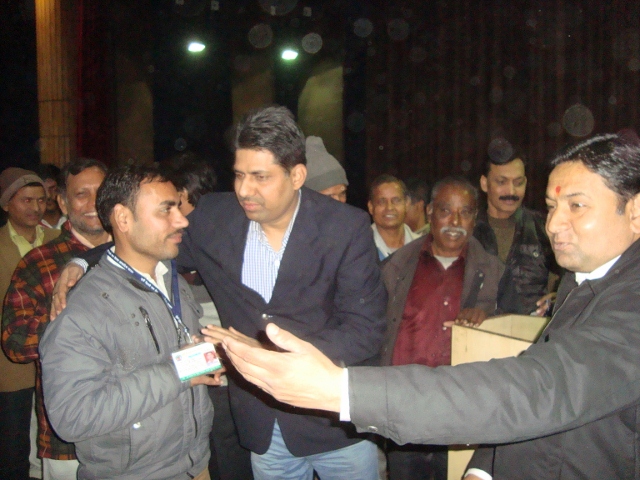
Hawker ID Cards
East Delhi Municipal Corporation on Jan 21, 2013 inaugurated the Identity card distribution to hawkers of Weekly markets. Mr. Sunil Jha, Chairman, Licensing and Tehbazaari Committee, EDMC distributed the I cards to hawkers at the program organized at EDMC headquarter. The Hon’ble Mayor, Standing Committee Chairman, Leader of the House, Leader of the opposition and many of the Councillors were also present on the occasion.
We held a meeting of hawkers in the EDMC park.

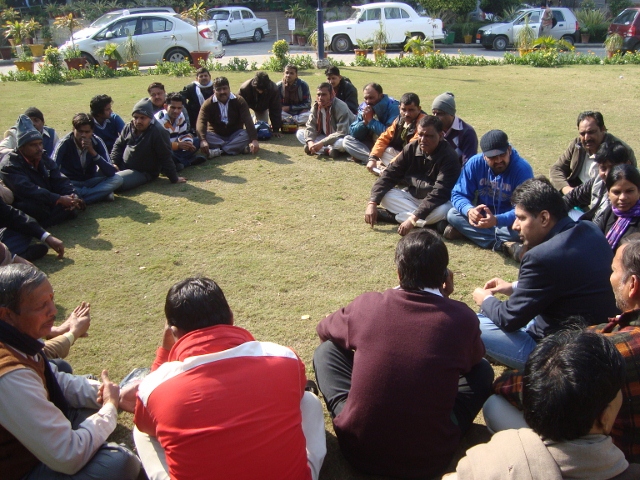
-
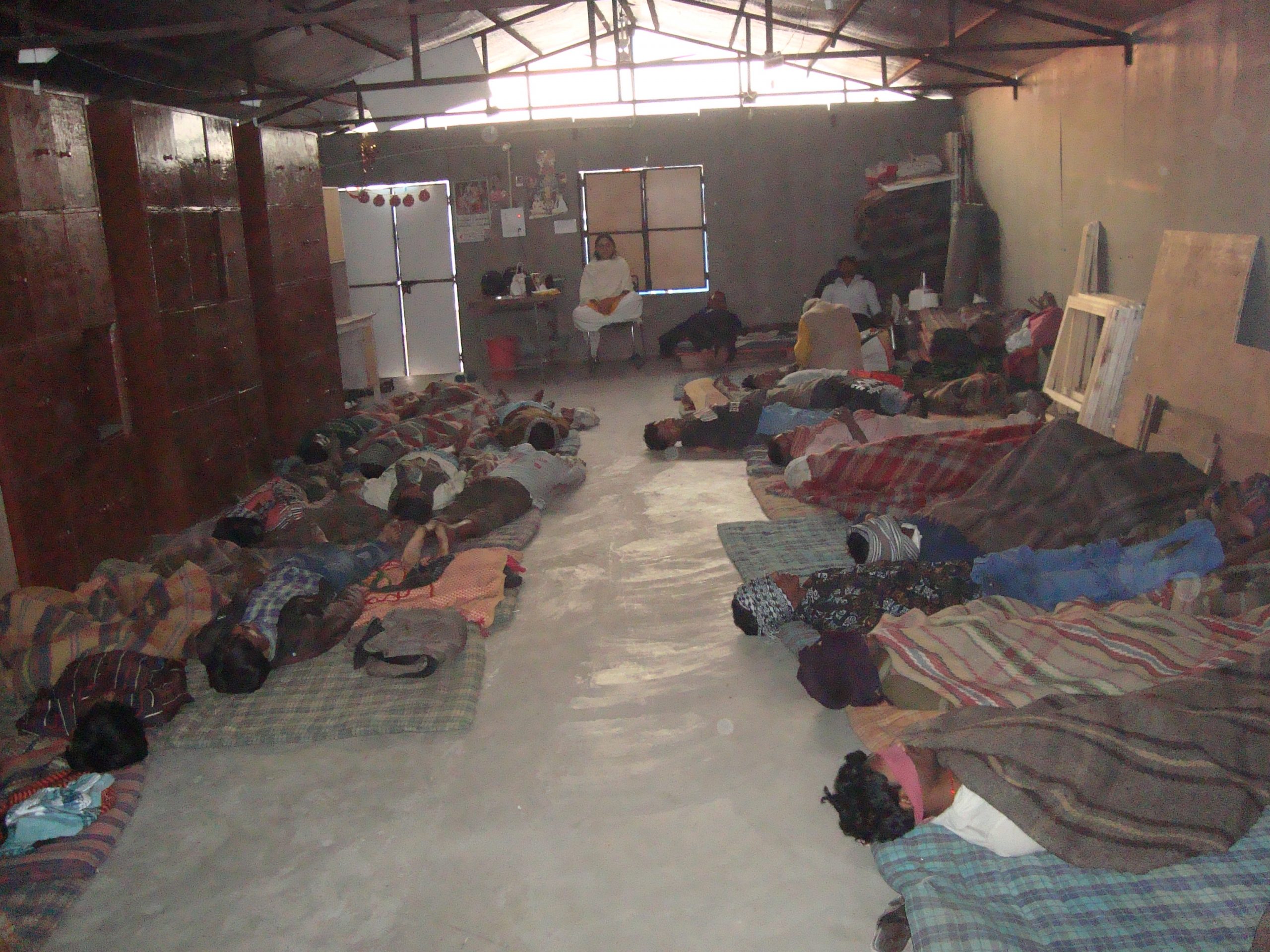
ACORN India Helps Homeless During Harsh Winter
The number of deaths of homeless people in India is rising.
According to the United Nations Development Programme’s Homeless Survey 2010 report there are 56,000 homeless in Delhi. At present, Delhi has around 150 night shelters; 84 temporary and 66 permanent. This is significantly less than one night shelter for every one lakh people across Delhi as mandated in Delhi Master Plan 2021. The capacity of these shelters varies from 40 to 200 people. According to the Delhi’s Urban Development Minister, the total capacity of permanent night shelters is 9,400 and the capacity of temporary shelters is 4,200. The Delhi government has earmarked Rs 6 crore for the 2012-13 financial year to construct, manage and maintain shelters in Delhi.
ACORN’s Delhi Partner Janpahal is managing three temporary shelters and one permanent shelter. As Delhi continues to shiver in the grip of a cold wave, we are grappling with the task of providing shelter to the homeless citizens of India. All our shelters are nearly always overcrowded. We are stretched to our limits. Delhi urban Shelter Improvement Board has provided the basic infrastructure of porta cabins with water, power, toilets, blankets, carpets etc. We regularly outreach to homeless citizens to bring them to shelters where we engage them with various kinds of programmes. We provide facilities like locker and first aid and link the homeless patients to nearby hospitals. We also conduct counselling sessions with chemically dependent homeless citizens for drugs de-addiction. Newspapers are available in shelters. Targeted training workshops and awareness building are regular features of the programmes. Since most of the homeless residents are undocumented, we have concerted drive to get them counted in the census and enroll them as voters.
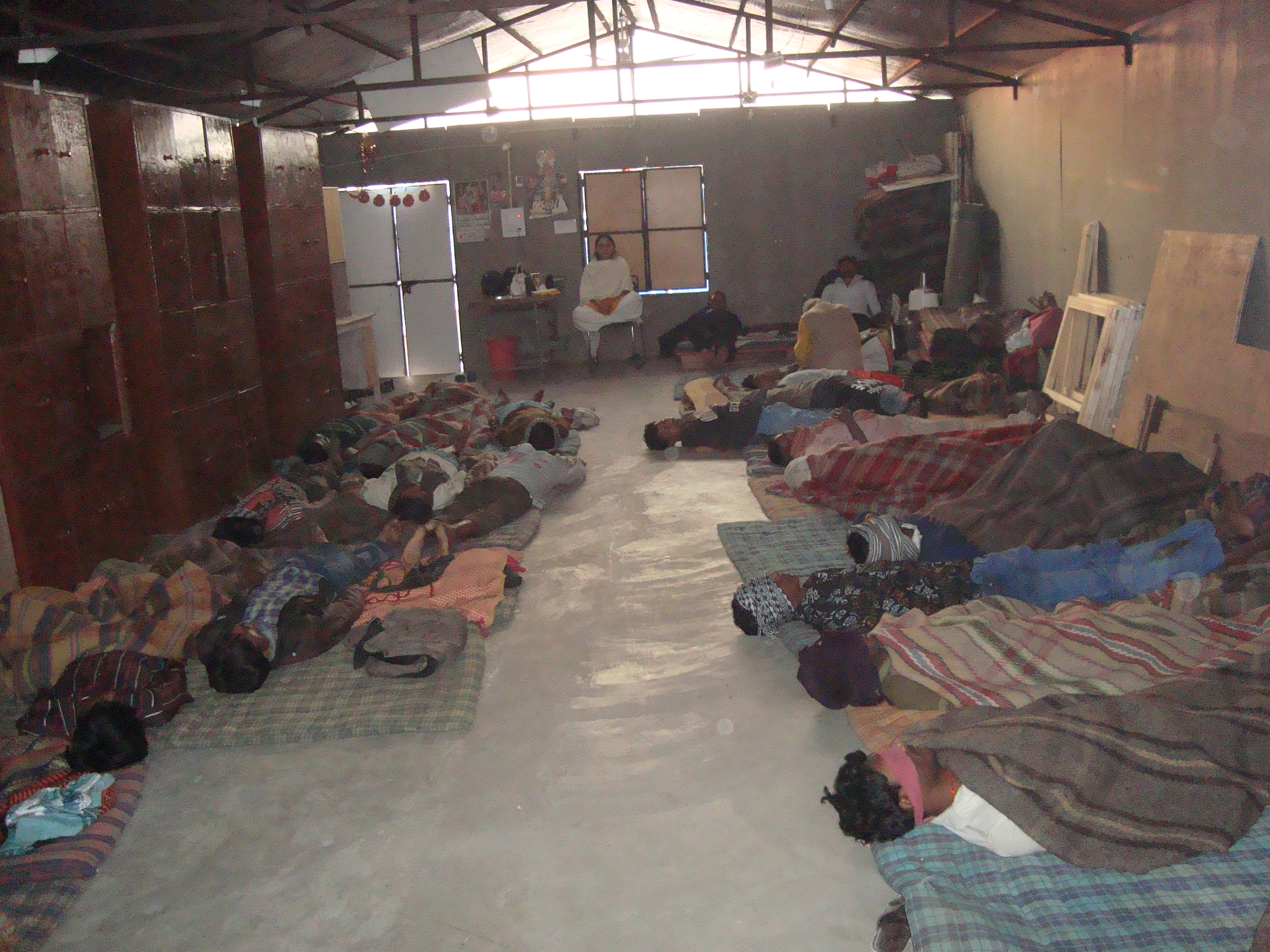
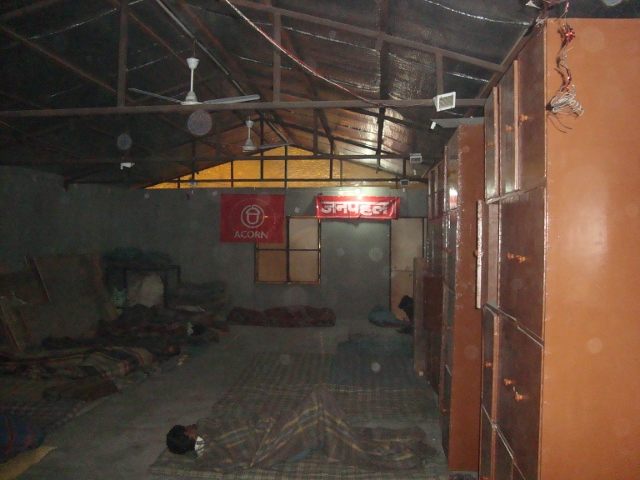
-
ACORN Foundation India Featured in Hindustan Times
Tuesday, January 08, 2013
Aarefa Johari, Hindustan Times
January 06, 2013
Email to Author
First Published: 01:04 IST(6/1/2013)
Last Updated: 01:07 IST(6/1/2013)
Dharavi-ology
American writer Joseph Campana first discovered the world of Dharavi when he signed up for a slum tour in April 2008, and came back fascinated. An English teacher at an international school in Mumbai, Campana, with a batch of Class 7 students, meandered through Dharavi’s potters’ colony, recycling quarters and papad-making area, getting glimpses of life in the city’s most well-known slum settlement.
“I was struck by how many people there were, walking up and down, engaged in various businesses, full of energy,” says Campana, who lived in Mumbai till 2011 and then returned to Montana, USA. “It was astounding.”
In November 2008, non-profit organisation Acorn Foundation India invited Campana to compile and edit a book about life in the slum.
When this book, a collection of 24 essays by prominent city journalists, hits the shelves in February, it will be the latest addition to an expanding tapestry of narratives on Dharavi.
The book’s tentative title —Everybody Loves Dharavi — is a striking indication of the phenomenon that this slum has become: In the past decade, as books, films, and research papers studying various facets of Dharavi have increased, the slum has become a magnet for visitors of every kind — tourists, students, architects, writers and social workers.
Dharavi is not the only settlement of the urban poor in Mumbai, and it is certainly not the poorest.
Where, then, does its unique appeal lie? For most, the answer is Dharavi’s socio-cultural diversity.
“Dharavi is not one slum. It is a group of contiguous settlements where each nagar has its own distinct history and ethos. It’s an amazing mix of India,” says journalist Kalpana Sharma, author of Rediscovering Dharavi, one of the first books on Dharavi published in 2000.
Dharavi is also a slum of entrepreneurs, with small-scale businesses operating in every other hutment.
“It is a slum of hope, not despair, and people are attracted by that positive energy,” says Rashmi Bansal, co-author of the 2012 book Poor Little Rich Slum.
In the midst of this frenzied anthropological curiosity, some are now sceptical about the ethics of turning the people of Dharavi into passive subjects of research work that they have little access to.
The slum’s residents have always have mixed views — be it indignation, indifference or an interest in visitors — but now, researchers are questioning their own roles.
British artist Ben Parry believes that Dharavi has been ‘fetishised’.
Five months ago, he launched a project called Reversing the Gaze to get Dharavi locals to question visiting outsiders and maintain an archive of all the research material in which they have been featured.
While this highlights the need for researchers to be sensitive, their work has a bright side too.
“Because of constant research, people in Dharavi have become more assertive,” says Anita Patil-Deshmukh, executive director of non-profit urban research organisation Pukar.
“They have understood their contribution to the city and know that their land is precious. I hope that they have learnt how to leverage this knowledge for their own benefit.”
Interview: Ben Parry, British visual artist
Looking back at the world
London-based visual artist Ben Parry came to Mumbai a year ago on a research residency with urban think tank URBZ to study how informal urban practices, such as street vending, appropriate space.
While exploring Dharavi, Parry grew conscious of his presence as an outsider and began to question the ethics of his research.
In September, he launched Dharavi: Reversing the Gaze, a project that helps residents examine researchers’ norms of knowledge production and consumption.
The ongoing project is being run by Parry, American filmmaker Sean Flynn and NGOs Acorn Foundation and CAMP.
What drew you to Dharavi and then question your role as a researcher?
Dharavi’s worlds are compelling on so many levels, not least for their ability to have endured the city’s expansion whilst creating conditions in which so many were able to rise out of poverty.
But my presence as an outsider signalled the possibility of a threat — doing harm by critiquing and exposing unregulated practices.
Rather than dismiss the presence of the specialist or tourist as an ‘uninvited guest’, I felt compelled to think deeply about the implications of my own presence in a muddled neo-colonial narrative of perceived exploitation and the fetishisation of slum life as representative of the urban poor.
Why should researchers worry about such things?
In Dharavi I see a disconnect between reality and representation. Since its residents have little or no control over their own representations and are mostly oblivious to the context and consequences of how these representations are consumed, the ethics of the anthropological gaze remains in crisis.
Tell us about Reversing the Gaze.
The project involves former residents of the 13th Compound, one of the most iconic images of Dharavi, until they were evicted last year from their homes near the pipeline at Mahim — reproduced in films and documentaries and endlessly photographed. Yet the community had no documented history of its own.
With a group of five women and two men from the area we have identified former residents and begun to trace displacement.
Through a video booth, they can interview researchers coming in. To close this loop of documenter and subject, I began printing photographs of Dharavi, tracing their subjects, such as the Kumbharwada boy featured on the cover of National Geographic magazine, and giving a copy back to them.
© Copyright © 2012 HT Media Limited. All Rights Reserved.
-
Retail FDI: India Plans to Amend its Antiquated Labour Laws
http://economictimes.indiatimes.com/news/economy/policy/retail-fdi-india-plans-to-amend-its-antiquated-labour-laws/articleshow/17513203.cms
NEW DELHI: The government plans to revolutionise the retail sector to make India a global shopping hub, with new labour laws to support 24-hour business, limiting reckless multiplication of malls to prevent urban chaos, and strong measures to ensure small shopkeepers also thrive in the transformation.
The consumer affairs ministry also wants to allow farmers to directly sell their produce to retailers, and adopt a uniform countrywide licensing regime to accelerate retail growth. The issue of modernising retail to ensure that benefits reach every section of society was debated in the cabinet when it approved FDI in multi-brand retail.
To facilitate such far-reaching changes, the government plans to set up a committee of central ministers of agriculture, commerce, corporate affairs, environment,finance, food, labour, railways, urban development and infrastructure ministries, official sources said.
Another panel of secretaries, representatives from IIMs, industry bodies, consumer activists and trader associations will also study the retailing sector. The move is expected to bring on board small traders and shopkeepers, who are apprehensive about loss of business if large international companies set up shop in India.
Traders welcomed the move. “This is a fantastic method to take things forward… It will smoothen out trade at pan-India level,” said Kumar Rajagopalan, head of Retailers Association of India, which has 400 modern retailers as members.
The government panel will discuss ways to modernise labour laws and amend them to be more supportive of retail requirements pushing for 24x7x365 work environment. It will also look at means to reduce multiple licensing requirements and offer a single-window facility for retail operations throughout the country.
Safeguards for Small Stores
“It will also consider establishing a national commission to study the problems of retail sector,” said a consumer affairs ministry official.
Madan Sabnavis, chief economist at CARE Ratings, said the government has safeguarded interests of small kirana shopowners and manufacturers in its notification on FDI in retail by ensuring 30% outsourcing from local small and medium industries. “Walmart, if it comes, can’t open 30-40 stores at one location even in cities like Delhi and Mumbai.
It gives enough space for small stores to operate, which can thrive on their doorstep services. The government should modernise APMC Act to create direct linkage of farmers with retailers,” he said.
However, Dharmendra Kumar, director, India FDI Watch, an NGO that has opposed the entry of foreign retailers, said the government should have sufficient regulatory framework to control the rampage of foreign retailers entering the Indian space. “There is no cap on the number of stores a big retailer can open in a city. Nor there is any specification on size of the store. In absence of such regulations, these supermarts can open in any location interfering with the operations of small stores,” he said.
The panel, however, is looking at putting some safeguards in place to help small stores. “It will work out a legal and regulatory mechanism to ensure that large retailers don’t displace small ones and even misuse their higher buying power to create a one-sided price war besides setting up in-built policy to relocate or reemploy people who are affected due to opening up of big malls in the vicinity of their shops,” another official of consumer affairs ministry said. The committee will also consider recommendations of the parliamentary standing committee on retail sector, and suggestions of the study on organised retail by the Indian Council for Research on International Economic Relations (ICRIER).
ICRIER had endorsed the entry of branded chains in retail sector, saying the sector is likely to grow at 13% till 2011-12 with organised retail growing at 45-50% in this period and unorganised retail at about 10%.
A recent study by ICRIER on facilitating trade has argued that pan-India supply chains cannot be established unless GST is implemented. Arpita Mukherjee, professor, ICRIER, said retailers face multiple regulations that vary across states and this creates hurdles for smooth functioning.
“For example, the central government can have a model Shops and Establishment Act that states can implement. This Act should have provisions for modern retail to operate such as possibilities to employ on a rotational basis and flexibilities in shop opening timings. If these reforms are implemented within two years, it will lead to investment in backend and help to reduce wastage,” she said.
